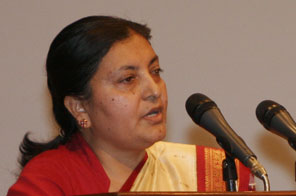Bhandari meets Indian leaders
NEW DELHI: Defence Minister Bidhya Devi Bhandari, who landed here for routine health check-up, today met ruling Congress leader Dr Karan Singh, opposition party leader and president of the Bharatiya Janata Party Nitin Gadkari and his predecessor Rajnath Singh and appraised them of the current political situation in Nepal.
Minister Bhandari briefed the Indian leaders of Nepal's contemporary politics and efforts to bring peace process to a logical conclusion.
Indian leaders were concerned about Nepal's entire peace process, Minister Bhandari said. Bhandari told Indian leaders that if all the political parties were one on major issues, the country could easily take the peace process to a logical conclusion and write the constitution timely.
Bhandari also said that the Indian leaders were especially interested in knowing how the issue of Maoist combatants' integration would be resolved.
"I told them that the parties have different views," Bhandari said, adding, however that no Indian leaders she met had made any comments on Nepal's UCPN-Maoist anti-India campaign.
"It was merely a courtesy call, so I did not dwell at length on those issues," the Minister added. According to Yuvraj Banskota, chairman of All India Nepalis Free Students Union, who was privy to the meeting, Dr Singh had ruled out the alternative to Madhav Kumar Nepal-led government in Nepal.
"India would continue supporting the latter as it had been doing in recent months," Banskota quoted Singh as saying during his meeting with Bhandari. "The issue of army integration is for the Nepalis to resolve. We have nothing to say on that matter but we will continue providing support to the present government," Dr Singh had said, according Banskota.
Dr Singh, however, told Minister Bhandari to handle the issue of army integration with 'extra care'. In her meeting with former BJP President Rajnath Singh, Bhandari said her party played crucial role in bringing the ex-rebels into political mainstream and would again be successful in bringing them on board.
"I have my doubts about the Maoists but since you are hopeful of bringing them on board, I wish you all success," Banskota quoted Singh as saying.
Minister Bhandari told the BJP leader that she believed Maoist combatants should be integrated into security organs if the nation needed their service and if they met eligibility criteria. She told Singh that she was in favour of settling the combatants' integration issue by taking all the ruling coalitions and political parties of the CA into confidence, according to Banskota.
Gadkari told Bhandari that the roots of Nepal's present woes and also that of UP and Bihar in India lied in poverty, backwardness and deprivation of educational opportunities and both the nations could overcome these challenges by accelerating collaboration and formulating comprehensive plans jointly.
Gadkari told Bhandari that he was ready to tell BJP run states and MPs to provide all help to enable Nepal achieve its socio-economic goals. "I found Gadkari a politician unlike other Indian leaders who dwelt more on contemporary political issues. Gadkari talked of socio-economic problems," Banskota commented.






